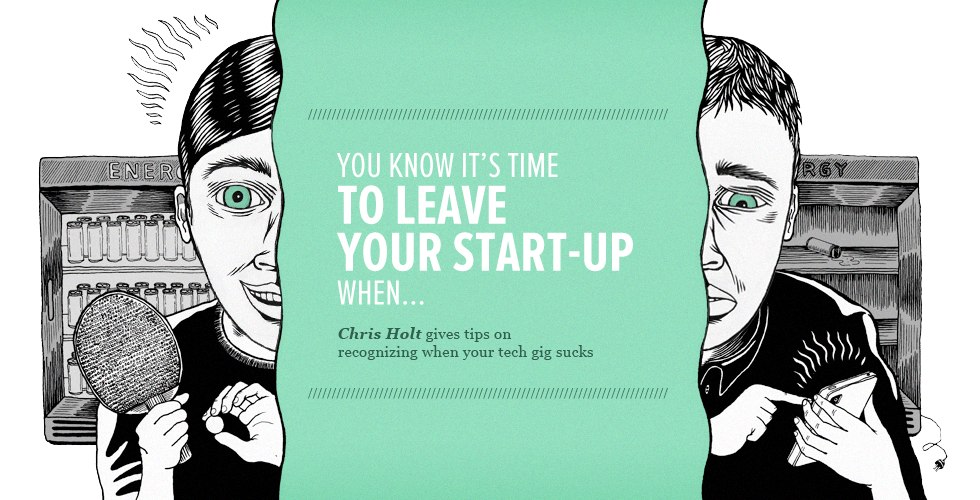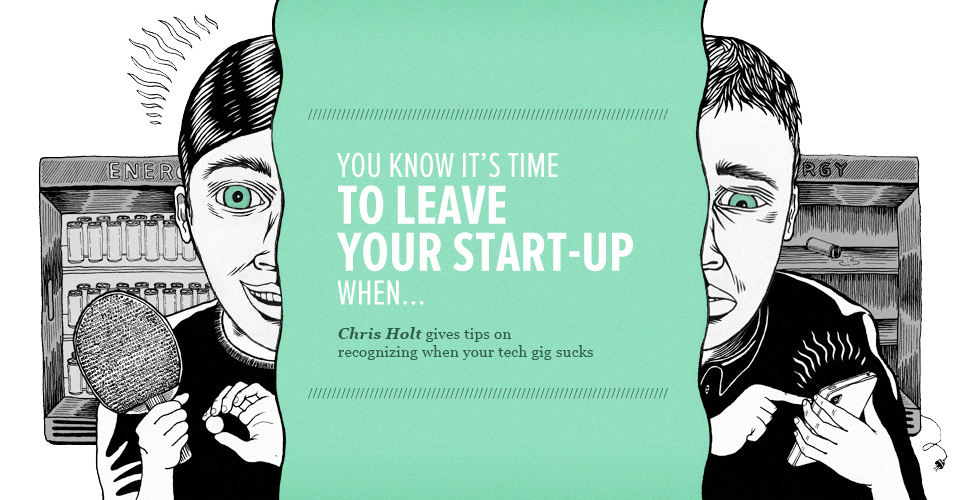
In the Bay Area, the temptation to work at a start-up is everywhere. Whether you’ve driven past the throngs of smartphone-watching shuttle commuters or you’ve gone green with envy at the luxurious cafeterias some companies offer, it’s not hard to see why people are drawn to the start-up culture. The legendary high paychecks, epic parties, and exceptional benefits have attracted talent from all over the world.
But that doesn’t mean you should roll with it when your start-up begins to suck. Here’s a list of warning signs and red flags that indicate that it may be time to move on from that dream job, before it becomes a nightmare.

Remember when you first started at the company? Free chips, a fridge full of Red Bull, a ping-pong table and an Xbox 360 — all there for your enjoyment. When you were sold on the company, someone likely told you that the staff works hard but parties hard too. But in your tenure, the parties have been phased out, the ping-pong table is now covered in mothballs, and the Xbox is to be played only after work hours. Suddenly, the “party hard” aspect of the work culture has become “hardly partying.” Now the occasional keg seems like a desperate attempt for the company to still be cool.

If you’re in the technology sector, you’ll routinely throw around words that the layman may not fully understand. You work developing browser-based apps, gamefication platforms, or something in the Cloud. You used to feel pity for those who didn’t understand the cool, exciting thing your company was doing. But after the dozenth recitation of what your company does is met with blank stares, you put out a long, ennui-filled sigh.

You were hired at a tech company based on certain skills and experiences that you demonstrated in your resume. But since you started, the start-up has shifted its direction, and you’re tasked with new roles and responsibilities. You’re a product manager one month, a social media editor the next — when you’re not the assistant events coordinator or whatever it is you were actually hired to do. Sure, this will look good on your resume, but as you look at your original job posting, you miss it.

Your CEO is featured in the New York Times, drives a Tesla, and spends his/her vacation time saving orphans, whales, or both. Your company is on the map because of this person. But here they are, in hour two of the quarterly pep talk, and you can’t help but think that every single thing they’re saying now is either overly optimistic, misleading, or just plain wrong.

You went to a top-ten university and slaved away to graduate cum laude, and you know you had to climb over a dozen people just to get this job. Now that you’re here, though, you realize that all your brainpower is being reduced to attending meetings, answering calls, and responding to e-mails. Part of you is happy that you don’t have to work too hard, but part of you wonders if a trained monkey could do what you do.

You don’t think the people who fund your company are literally devils, but nothing signals a lack of confidence in a business more than hovering investors. Maybe it was your company’s early decision to buy boxes upon boxes of now unused swag, or perhaps it was three consecutive quarters where your sales team missed their goal. Whatever the reason, people in suits who make your bosses sweat are now in the main conference room and the office is as quiet as a grave.

Mike Judge’s iconic film of corporate malaise and existential angst is as relevant today as ever. But when you start comparing your boss to Bill Lumbergh, finding analogies in your own workflow to the inefficiencies of TPS reports or daydreaming about burning the corporate park down, yeah, you might want to leave soon.

No one is doing his or her job 100% of the time. With the Internet, there are so many ways to procrastinate. But as you get increasingly bored with your gig and find yourself spending more time on social media, catching up on your favorite web comics, or hopping down the Wikipedia rabbit hole, you notice that your work performance hasn’t suffered a wink. Why? No one is paying attention to you.

Sure, law school is a huge waste of money, and you were never good enough at chemistry to get into med school. But maybe business school is your ticket to success? Or art school? You daydream of days spent in classes, sleeping in late, and having to commute by bike. Student debt? Who cares? You’re bored now.

You’ve put in your time, and you know this company is going places. You have friends who have cashed in on their start-ups, and now it’s your turn. But going public comes with risks and also a certain visibility that your company’s management may not be ready for. If the CEO keeps putting off the eventual date of the IPO, then you need to wonder how long it’s worth waiting for.

Early on, you believed in the company, or at least enough to want to cash-in on the recruitment bonus you received for every successful hire that you recommended. But lately, you’ve stopped referring people to open positions, and when asked by the company recruiter if you know anyone great for the company, you lie and say you don’t.

You’ve noticed that since you’ve been hired, your small team has seen management job titles being given away like candy. That new intern? VP of content development. Though your business card says “Director of Global Operations” your paycheck says “low-level minion.” Future employers may well question how quickly you moved up the ladder, and why your title doesn’t match your purported salary or responsibilities.

The business has become one in which there are never enough resources, when every dollar is watched and every purchase requires four approvals, aside from the annual Christmas party at AT&T Park. To both employees and consumers, the company exaggerates what it has to offer.

Businesses shift their priorities; human resources gets stretched thin; and suddenly, you, the contract worker, has gotten lost in the mix. You exist in career limbo, waiting to be converted to full time or let go. You realize that if your company doesn’t value you enough to give you full benefits, a salary, and a vote of confidence, your clear career trajectory is suddenly nothing more than a myth.

Start-ups are more attractive than regular companies because of the perks, the casual atmosphere, the parties, and the small, friendly vibe. But when your free-spirited, work-hard/play-hard crew starts transitioning to a legitimate big-business, buttoned-down company, you’ll encounter many of the above situations. Then, maybe it’s time to refresh the resume.







